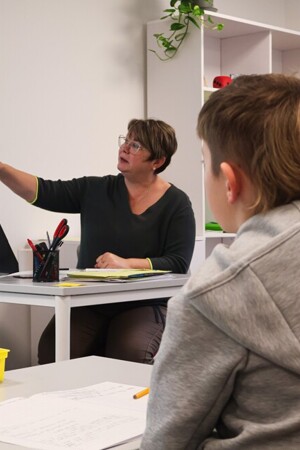British Curriculum
- Home
- Curriculum
- The British Curriculum
- Key Stage 4
Key Stage 4
Key Stage 4 – IGCSE
Key Stage 4 at The British School in Gothenburg serves as a vital stepping stone, preparing students for the internationally recognized IGCSE examinations. This phase spans Years 9 through 11, with Year 9 dedicated to a comprehensive Pre-IGCSE programme. During this year, students explore a wide array of subjects, allowing them to make well-informed decisions about their final IGCSE subject choices.
IGCSE Subjects
English as a Second Language is designed for students who already possess a functional command of English.
The syllabus:
-
Caters to learners whose mother tongue isn’t English but who study in an English-medium environment
-
Enhances the ability to comprehend and use English across varied contexts
-
Raises awareness of the nature of language and hones the four core skills—reading, writing, listening, and speaking
-
Emphasises practical communication for daily life, while laying the groundwork for advanced study
-
Builds transferable skills that support success across the wider curriculum
Mathematics equips students with essential problem-solving skills and serves as a foundation for further study or supporting other subjects.
The syllabus:
-
Builds competence, confidence, and fluency in techniques—with and without calculators—to deepen mathematical insight
-
Fosters an intuitive grasp of quantity, patterns, and relationships to enhance reasoning and analysis
-
Emphasizes solving mathematical and real-world problems
-
Encourages clear presentation and interpretation of results, reinforcing mathematical communication
-
Offers tiered assessments so all learners can succeed and advance in their studie.
The Accounting syllabus lays a strong groundwork for advanced study and careers in accounting or related fields.
The syllabus:
-
Examines accounting’s role for businesses, individuals, and non-profit organisations, and its wider societal impact
-
Introduces key techniques, procedures, terminology, and concepts
-
Strengthens numeracy and literacy through recording, reporting, presenting, and interpreting financial data
-
Raises awareness of ethical, technological, and sustainability considerations shaping modern accounting practice
-
Demonstrates how accounting operates across diverse contemporary economic and business environments
Computer Science inspires students to think computationally and master core problem-solving principles. Learners design and implement computer-based solutions by crafting algorithms and programming in a high-level language. Along the way, they build technical skills in coding, testing, and evaluating their creations.
By studying this course, students also:
-
Gain insight into current and emerging computing technologies, understanding both their advantages and potential risks
-
Develop a strong foundation for International AS & A Level
-
Acquire practical skills that enhance other areas of study and everyday life
This syllabus blends hands-on practice with theoretical study in physical education. It’s designed to foster a love of movement by involving students in a variety of activities while teaching them how to perform safely and efficiently. By examining the underlying principles, techniques, and training methods, learners develop a clear appreciation of how proper preparation enhances performance, health, and well-being.
IGCSE Mathematics equips students with essential mathematical skills for life and further study, while supporting other subjects.
The syllabus:
-
Builds competence, confidence, and fluency in techniques—with and without a calculator—fostering deep mathematical understanding
-
Cultivates a sense of quantity, patterns, and relationships to enhance reasoning and analytical skills
-
Emphasises problem solving in both mathematical and real-world contexts
-
Encourages clear presentation and interpretation of results, strengthening mathematical communication and justification
-
Offers tiered assessment routes to ensure all learners can succeed and advance in their studies
IGCSE History examines key international developments of the 19th and 20th centuries while offering in-depth study of selected regions and events.
The syllabus:
-
Builds learners’ historical knowledge and evidence-handling skills
-
Allows teachers flexibility to tailor engaging, relevant courses
-
Lays a strong foundation for advanced study and fosters lifelong interest in history
IGCSE Business Studies syllabus gives students insight into how public and private enterprises operate, emphasizing the roles of innovation and adaptation. They explore how different business structures are formed, funded, managed, and overseen. Students also examine the various factors shaping business decisions and appreciate the importance of collaboration and mutual reliance.
Beyond grasping core business theories and methods, learners strengthen skills like numerical reasoning and investigative inquiry. This course not only lays the groundwork for Cambridge International A Level studies but also equips students with practical knowledge for future careers.
IGCSE Combined Science offers an integrated course in Biology, Chemistry, and Physics, resulting in a single qualification and one overall grade.
The syllabus:
-
Enables learners to appreciate the biological and technological aspects of the world around them and stay informed about scientific advances
-
Covers core principles and concepts across the three sciences, highlights real-world applications, and places strong emphasis on hands-on practical skills
-
Builds the essential scientific skills and understanding needed to progress to Cambridge International AS & A Level studies
IGCSE Art & Design inspires individual expression by engaging students’ imagination, sensitivity, conceptual thinking, observational skills, and analytical insight.
The syllabus enables learners to:
-
Gain confidence and enthusiasm as they refine technical skills in both two- and three-dimensional composition
-
Tackle and resolve creative challenges in visual and tactile media
-
Evolve ideas from initial sketches through to polished outcomes
-
Recognize the impact of visual arts within historical and societal contexts
-
Expand their cultural awareness and personal experiences through artistic exploration
The Economics syllabus establishes a robust platform for advanced study and careers in economics or related fields.
The syllabus:
-
Introduces core economic terminology, concepts, and principles
-
Develops skills in handling economic data—analysing, interpreting, organising, and presenting information
-
Teaches analytical tools to evaluate relationships between economic variables
-
Examines the impact of factors such as demographic shifts, environmental sustainability, and globalisation
-
Encourages application of economic understanding to contemporary global issues
Enterprise immerses students in real-world business concepts, guiding them to think and act like entrepreneurs. As the first IGCSE course to adopt an entrepreneurial mindset, it deepens learners’ understanding of launching and managing a new venture. Through this syllabus, students build essential life skills in planning and organization, communication, and financial management.
The Geography syllabus gives equal weight to physical and human geography, embedding essential skills for a comprehensive understanding of the subject.
The syllabus:
-
Addresses timely, real-world issues, helping students spot both opportunities and challenges in a changing world
-
Shows how geographic insights guide the management of environmental, social, and economic concerns
-
Enhances investigative research and informed decision-making
-
Establishes essential knowledge, understanding, and transferable skills for future study or careers
The Cambridge IGCSE Sociology course invites students to examine social relationships, institutions, and changes, deepening their insight into how societies function.
The syllabus:
-
Encourages critical analysis of various social, economic, and political systems
-
Introduces core sociological research methods
-
Strengthens the ability to evaluate diverse types of data and evidence
-
Links concepts to students’ own communities, allowing them to apply their learning to understand their personal and local experiences
Students gain insight into technology’s societal impact and how Information and Communication Technology (ICT) can enhance life at home, in the workplace, and beyond. Through both hands-on and theoretical learning, they tackle problems using common applications—such as word processors and interactive presentation tools.
Learners will:
-
Analyse, design, implement, test, and evaluate ICT systems to ensure they meet real-world needs
-
Develop enduring skills that support success across all subjects and in future careers
Inspires students to investigate and address major worldwide challenges.
The syllabus:
-
Cultivates the ability to examine global issues through multiple viewpoints
-
Promotes both collaborative and independent work, applying insights across varied situations
-
Builds transferable skills that enhance learning across all subject areas
Biology empowers students to comprehend the living world and stay informed about scientific advances. The syllabus covers fundamental principles and concepts, highlights contemporary biological applications, and places strong emphasis on practical laboratory skills.
Additionally, learners build the scientific competencies necessary for progression to International AS & A Level, further study, or science-related careers.
The Business syllabus lays a strong groundwork for advanced study and careers in business and related fields.
The syllabus:
-
Familiarises students with essential business terminology and concepts
-
Examines various business structures and the roles of key internal and external stakeholders to illuminate decision-making processes
-
Strengthens numeracy by interpreting and analysing business data
-
Raises awareness of sustainability and environmental considerations in both local and global business contexts
-
Cultivates entrepreneurial skills relevant to today’s business environment
equips students to grasp the chemical foundations of the modern world and engage with ongoing scientific innovations. The syllabus covers essential principles and concepts, showcases real-world applications, and emphasizes hands-on laboratory skills.
Students also cultivate the experimental and analytical competencies required for progression to International AS & A Level, further study, or science-related careers.
The Food and Nutrition syllabus combines theory and hands-on practice in selecting and preparing food. Covering diet and health, students examine the nutritional content of staple foods and learn to plan and cook well-balanced family meals. The course also promotes consumer awareness and emphasizes rigorous personal and kitchen hygiene as learners apply their knowledge to create tasty, inventive dishes.
Music develops students’ listening, performance, and compositional skills.
They will:
-
Explore repertoire from a variety of cultures and historical eras
-
Perform and compose in styles of their own choosing
Physics helps learners to understand the technological world in which they live, and take an informed interest in science and scientific developments. The syllabus includes the basic principles and concepts that are fundamental to the subject, some current applications of physics, and a strong emphasis on practical skills.
Learners also develop an understanding of the scientific skills essential for International AS & A Level, further education or a career related to science.
Psychology introduces students to core concepts, theories, and research methods, laying a strong foundation for advanced study in the field.
The syllabus:
-
Welcomes learners with no previous background in psychology
-
Builds a solid understanding of key psychological ideas and explanations
-
Connects psychological research to everyday experiences
-
Highlights ethical considerations and the role of professional guidelines
-
Explores how individual, social, and cultural differences influence behaviour
-
Inspires curiosity about human thought and action
The IGCSE™ Environmental Management syllabus creates interest and enthusiasm about the environment, and helps students gain essential skills to progress to further study or employment.
The syllabus:
-
encourages learners to gain an interest in environmental issues that affect the individual, the community, and the wider world
-
develops the ability to communicate effectively and clearly, using appropriate terminology and scientific conventions
-
engages learners through practical fieldwork, promoting safe working practices and consideration for habitats and organisms
-
develops understanding of scientific data and evidence to solve problems and make decisions
-
enables learners to gain an understanding of climate change and have the knowledge and skills required to address climate-related challenges at local, national, and global levels
-
develops learners’ interest in environmental management through the discovery of strategies, their impacts, and ability to manage climate change that could inspire further study.




